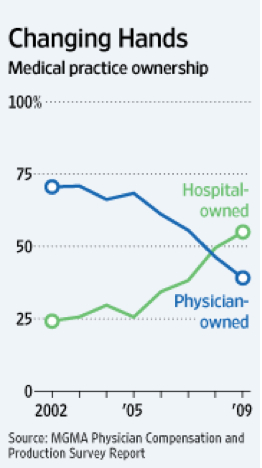February 23rd, 2011 by KevinMD in Health Policy, Opinion
No Comments »

There are plenty of reasons why medical students aren’t choosing primary care as careers. Lack of role models. Perception of professional dissatisfaction. High burnout rate among generalist doctors. Long, uncontrollable hours.
But what about salary? Until now, the wage disparity between primary care doctors and specialists has only been an assumed reason; the evidence was largely circumstantial. After all, the average medical school debt exceeds $160,000, so why not go into a specialty that pays several times more, with better hours?
Thanks to Robert Centor, there’s a study published in Medscape that shows how money affects career choice among medical students. Here’s what they found:
Sixty-six percent of students did not apply for a primary care residency. Of these, 30 percent would have applied for primary care if they had been given a median bonus of $27,500 before and after residency. Forty-one percent of students would have considered applying for primary care for a median military annual salary after residency of $175,000.
And in conclusion:
U.S. medical students, particularly those considering primary care but selecting controllable lifestyle specialties, are more likely to consider applying for a primary care specialty if provided a financial incentive.
Money matters. There should be no shame for new doctors to admit that. After all, they’re human too, and respond to financial incentives just like anyone else. And when most medical students graduate with mortgage-sized school loans, salary should be a factor when considering a career. Read more »
*This blog post was originally published at KevinMD.com*
February 23rd, 2011 by John Mandrola, M.D. in Better Health Network, Opinion
1 Comment »

 I am a doctor. Go ahead, call me what you may. Group me into a neatly, prejudged category: “All you doctors.” Just don’t label me a sponge.
I am a doctor. Go ahead, call me what you may. Group me into a neatly, prejudged category: “All you doctors.” Just don’t label me a sponge.
That’s right. Recently in the Wall Street Journal, Mr. Andy Kessler, famous author and former hedge fund manager smart enough to turn $100 million into $1 billion, grouped doctors into a sub-category of the service economy which he labeled as “sponges.” We could have done worse: His other categories included “sloppers” (DMV workers), “slimers” (financial planners), and “thieves” (cable companies).
It seems that doctors — along with cosmetologists, lawyers, and real estate brokers — offend him because of the tests and licenses that we deem necessary:
Sponges are those who earned their jobs by passing a test meant to limit supply. According to this newspaper, 23% of U.S. workers now need a state license. The Series 7 exam is required for stock brokers. Cosmetologists, real estate brokers, doctors and lawyers all need government certification. All this does is legally bar others from doing the same job, so existing workers can charge more and sponge off the rest of us.
His essay goes on to argue the tired notion that technology endangers jobs in the service sector — the toll booth operator argument, again. He likes the creators of stuff: Apple and Google. (Duh.) But in my mind, doctoring is about creating something: We create better and longer lives for our patients. Ask the patient cured of cancer how happy they are that some doctor created his or her treatment plan. Read more »
*This blog post was originally published at Dr John M*
November 22nd, 2010 by Edwin Leap, M.D. in Better Health Network, Health Policy, Opinion, True Stories
No Comments »

Here’s my [recent] commentary at KevinMD. Let me know what you think. What kind of physicians DO we want for the future?
I was talking with a pre-med student recently. He had completed his very first medical school interview and was, understandably, excited. But he told me the interviewer had asked him what he thought would be the outcome of the current healthcare reform measures.
I laughed to myself. After 17 years in practice, even I don’t know the outcome, though I have my suspicions. It seemed a loaded, almost unfair question. After miring students in biology, physics, chemistry and every known application-padding activity, after expecting volunteerism and activism, I’m not sure why they would expect this young man to have any earthly idea about the reform measures from his current position in the medical biosphere.
But I wondered, since I’m not a medical educator, was there a right answer? And I wondered even more, what do we want in our future physicians? Read more »
*This blog post was originally published at edwinleap.com*
November 8th, 2010 by Bryan Vartabedian, M.D. in Better Health Network, Health Policy, News, Opinion
2 Comments »

 I didn’t need the Wall Street Journal to tell that the days of “private practice” are numbered. According to recent numbers, fewer and fewer medical practices are under the ownership of physicians. Even in my corner of the economically secure State of Texas, small practices are folding faster than beach chairs at high tide.
I didn’t need the Wall Street Journal to tell that the days of “private practice” are numbered. According to recent numbers, fewer and fewer medical practices are under the ownership of physicians. Even in my corner of the economically secure State of Texas, small practices are folding faster than beach chairs at high tide.
I was driven out of private practice in 2004 by rising malpractice premiums and plummeting reimbursement. In Texas at the time the trial attorneys ran the place and medmal insurance carriers simply couldn’t keep up with the greed.
Medical practices are just too expensive to run and the services that physicians provide are dangerously undervalued. You do the math. Sure it’s a complicated issue. But the end result is institutionally-employed doctors with institutional pay and the risk of institutional service. Read more »
*This blog post was originally published at 33 Charts*
November 1st, 2010 by EvanFalchukJD in Better Health Network, Health Policy, News, Opinion
1 Comment »

You want to see a doctor? You’re going to have to wait. And I don’t mean like an hour in the office. I mean like 53 days.
It’s not some doomsday story from the future. It’s happening today here in Massachusetts. Massachusetts — the state whose 2006 law was the model for the federal healthcare reform law. Massachusetts — home to some of the world’s best medical centers and doctors. And, as the Boston Globe’s “White Coat Notes” blog reports, Massachusetts — home to doctor shortages and long waits to see a doctor:
When primary care patients do secure an appointment for a non-urgent matter, they have to wait to get in the door, the survey found. The average delay is 29 days to see a family medicine doctor, down from 44 days last year, and 53 days to see an internist, up from 44 days last year.
The report said shortages also exist in dermatology, emergency medicine, general surgery, neurology, orthopedics, psychiatry, urology, and vascular surgery.
But what about costs? If you make sure everyone’s covered, you’ve got the foundation for real cost control, right? Unfortunately, no. Healthcare costs have been booming in Massachusetts:
Costs are rising relentlessly for both families and for the state government. The median annual premium for family plans jumped 10% from 2007 to 2009 to $14,300 — again, that’s a substantial rise on top of an already enormous number. For small businesses, the increase was 12%. In 2006, the state spent around $1 billion on Medicaid, subsidies for medium-to-lower earners, and other health-care programs. Today, the figure is $1.75 billion. The federal government absorbed half of the increase.
So what are the lessons for the future of American healthcare? Read more »
*This blog post was originally published at See First Blog*


















